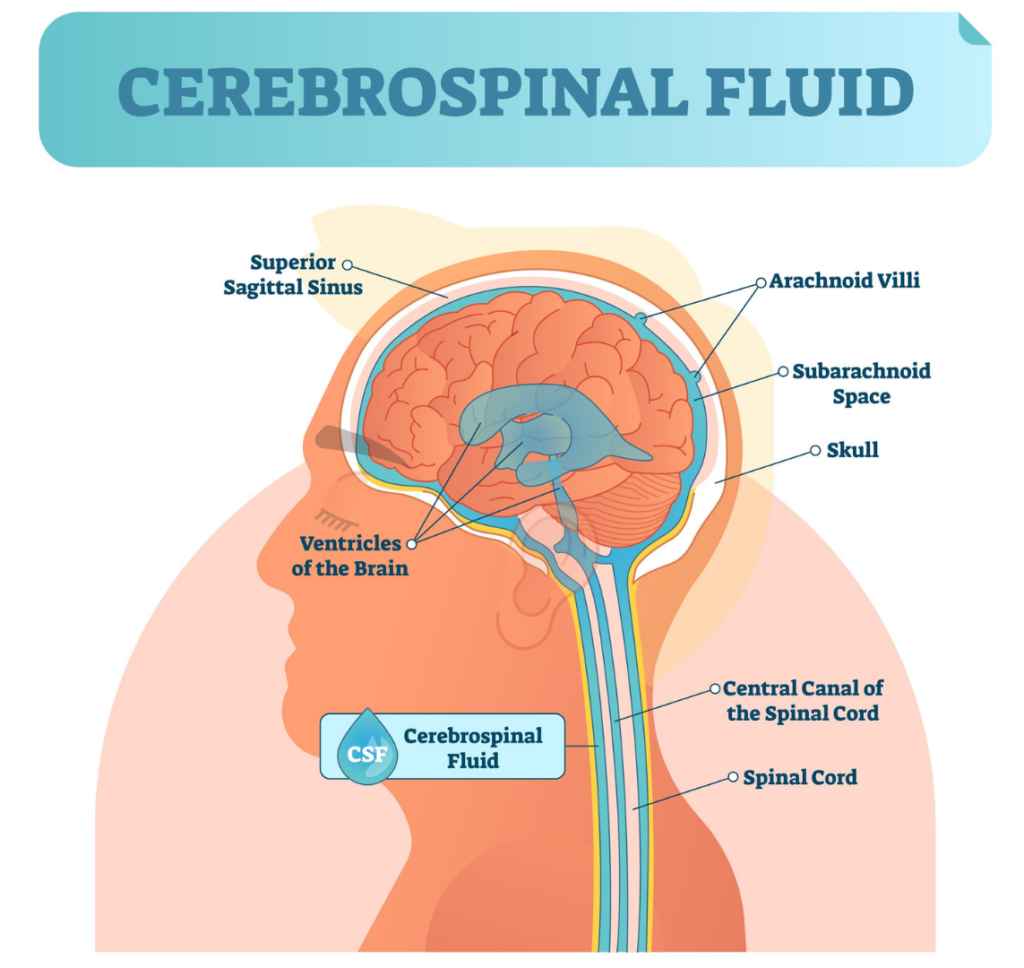Cerebrospinal fluid is a transparent liquid that envelops the brain and spinal cord.
The cerebrospinal fluid functions as a protective cushion for the delicate neural tissue that it covers. Additionally, it plays a role in supplying nutrients to the brain and facilitating the removal of metabolic waste products from brain tissue.
Cerebrospinal fluid is found within the brain’s ventricles, the spinal cord’s central canal, and the subarachnoid space surrounding the brain and spinal cord. It is produced through specialised choroid plexus cells, which actively secrete it into the brain’s ventricles.

The circulation of cerebrospinal fluid plays a crucial role in maintaining brain health. Disruptions in cerebrospinal fluid circulation, such as a cerebrospinal fluid fistula, can lead to complications. Proper cerebrospinal fluid reabsorption, facilitated primarily by structures such as arachnoid villi (small finger-like structures near the brain and spinal cord), is necessary to maintain equilibrium, preventing issues such as fluid buildup, which can exert pressure on the skull. Conversely, conditions like reduced cerebrospinal fluid volume, such as in the case of a leak, can also lead to complications and should be promptly addressed by a healthcare professional.
A cerebrospinal fluid leak happens when there is a tear or hole in the membranes surrounding the brain or spinal cord, allowing the clear fluid that surrounds and cushions those organs to escape. This leakage can lead to a decrease in pressure around the brain and spinal cord, a condition known as intracranial hypotension, and other various potential symptoms.
There are two distinct types of cerebrospinal fluid leaks: spinal cerebrospinal fluid leaks and cranial cerebrospinal fluid leaks.
Spinal cerebrospinal leaks can occur anywhere along the spinal column, while cranial leaks take place within the skull. Rarely, cranial leaks may result in clear fluid drainage from the nose or ear. Depending on the severity and site of the tear, cerebrospinal fluid leak symptoms may vary, with some posing a risk of life-threatening complications.
Symptoms from a spinal cerebrospinal fluid leak include:
Symptoms from a cranial cerebrospinal fluid leak include:
Generally, cerebrospinal fluid leaks can be treated with a thorough medical evaluation. However, if left untreated, they may lead to severe complications, including life-threatening meningitis.
There are several possibilities as to what forms cerebrospinal fluid leaks, such as:
Occasionally, a spontaneous cerebrospinal leak occurs without an identifiable cause.

The diagnosis of a cerebrospinal fluid leak usually begins with a comprehensive physical examination and medical history assessment. Due to the challenge of detecting cerebrospinal fluid leaks, which can lead to misdiagnosis or delayed diagnosis, a thorough examination by a healthcare professional is crucial.
Typically, various tests are employed to evaluate the patient’s condition, including CT scans, MRI scans, myelography (imaging test to look for abnormalities), or radioisotope studies (which entail the injection of chemicals to track cerebrospinal fluid flow and identify a leak).

After a proper diagnosis, doctors can prescribe appropriate cerebrospinal fluid treatments based on the individual needs of the patient. Doctors may recommend complete bed rest for patients with less severe cases for recovery.
Alternatively, if patients do not respond to conservative treatments, doctors may recommend specific procedures. These options might involve a blood patch or surgery, with minimally invasive surgical procedures also being considered when applicable.
Recognising that your symptoms may be a sign of a more serious condition is vital, and seeking timely consultation with a specialist is advisable. If you experience intense headaches that worsen with movement or are uncertain about your symptoms, schedule an appointment with a Neuro and Spine Surgeon for a thorough evaluation and diagnosis.
Contact Us For More Information
We provide quality specialised care for neuro and spine conditions.
For enquiries, leave a message and our friendly team will get in touch with you.
Monday – Friday: 9:00AM – 5:00PM
Saturday: 9:00AM – 12:30PM
Sunday & Public Holiday: Closed
We provide quality specialised care for neuro and spine conditions.
For enquiries, leave a message and our friendly team will get in touch with you.
Monday – Friday: 9:00AM – 5:00PM
Saturday: 9:00AM – 12:30PM
Sunday & Public Holiday: Closed
We provide quality specialised care for neuro and spine conditions.
For enquiries, leave a message and our friendly team will get in
touch with you.
Monday – Friday: 9AM – 1PM | 2PM – 5PM
Weekends & Public Holidays: CLOSED
© 2023 All Rights Reserved | Advanced Brain & Spine Surgical Centre | Terms & Conditions